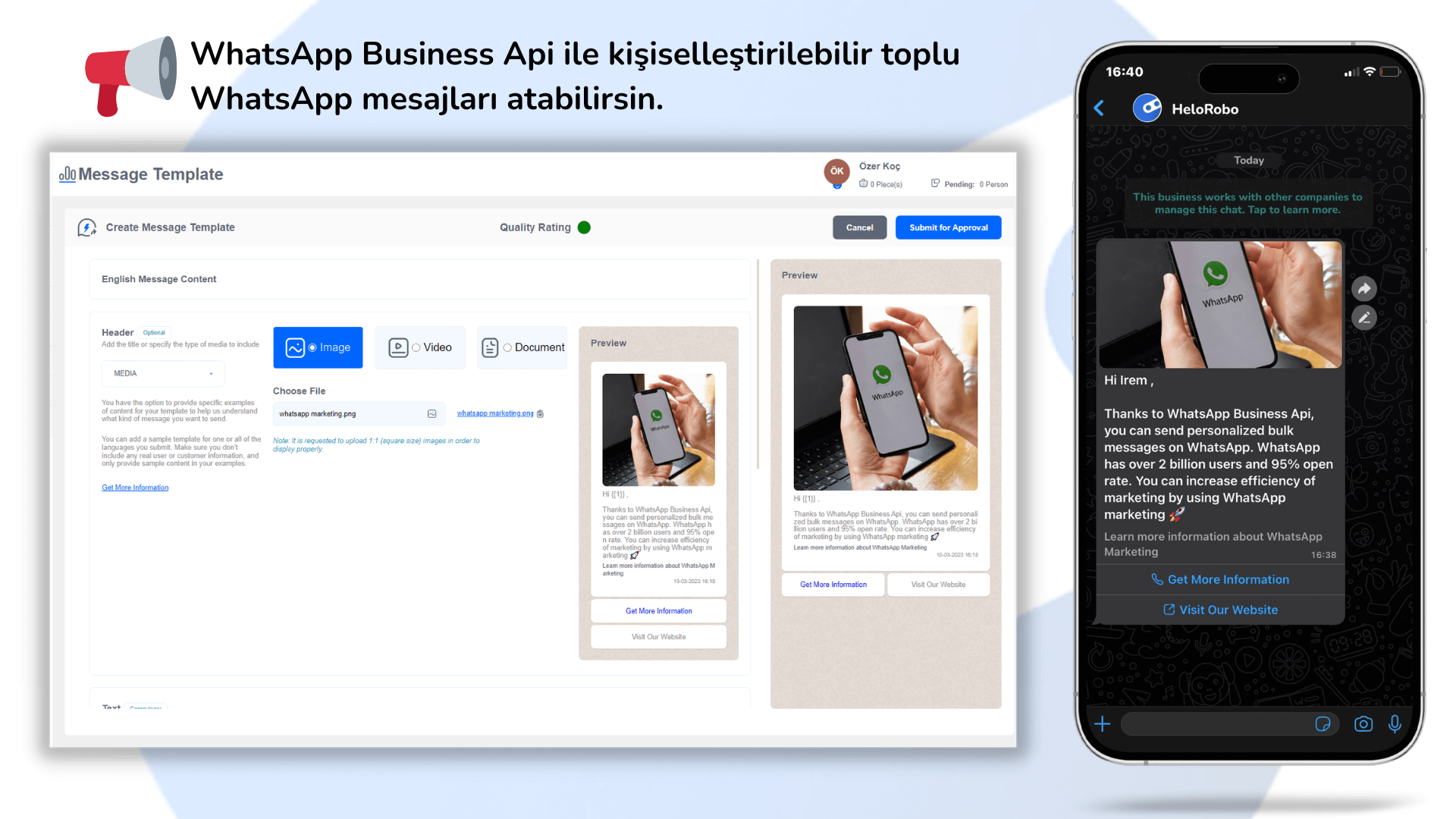Email vs. WhatsApp Business API: The Complete Comparison

Which one is the best for my business: Email or WhatsApp Api?
Maintaining contact with your consumers is more important than ever in the fast-paced world of today. Choosing the appropriate platform is crucial to ensuring customer happiness and brand loyalty since communication is the lifeblood of every organization. Which form of communication—the ground-breaking WhatsApp Business API or the time-honored Email—should you rely on? We’ll go through the advantages, drawbacks, and features of each platform in this post so you can decide which is best for your business.
What is WhatsApp Api in Brief?
Benefits and Features of WhatsApp Business Api
An excellent solution created to assist businesses in communicating with their clients is the WhatsApp Business API. WhatsApp offers a significant potential audience for your company with more than 2 billion users globally. Key characteristics and advantages include:
- 1. Instant messaging: Real-time message sending and receiving ensures prompt client service.
- 2. Share papers, audio messages, movies, and other multimedia to improve communication.
- 3. Automate replies to frequent enquiries with chatbots and automation, saving time and resources.
- 4. End-to-end encryption: Providing private and secure communication.
- 5. Custom alerts: Directly contact your consumers with notifications, updates, and promotions that are tailored to them.
- 6. Message Template: Message Templates gives opportunity to send bulk personalized WhatsApp messages. It is ideal for newsletters and marketing.

Limitations of WhatsApp Business Api
However, there are several restrictions with the WhatsApp Business API, including:
- 1. Charges for specific communications: Sending messages that follow a template may be expensive for small businesses.
- 2. Open to Misuse: WhatsApp is to personal inbox. Therefore, spamming is the biggest problematic issue of WhatsApp Business Api. Companies need to be cautious about customers’ privacy.
An overview of email
Benefits and Features of Email

Because of its adaptability, email has been a go-to method of corporate communication for decades. Key characteristics and advantages include:
- 1. Accessibility: It is more inclusive as it is available on any device with an internet connection.
- 2. Sending messages to several individuals at once is known as mass communication, and it is perfect for newsletters and advertising.
- 3. Customization: Add HTML, graphics, and complex formatting to messages to make them more unique.
- 4. Tracking and analytics: Use open rates, click-through rates, and other data to gauge the effectiveness of your efforts.
- 5. Integration: For a smooth experience, integrate with numerous tools and platforms.
Limitations of Email
Despite being widely used, email can have several limitations, including:
- 1. Slow response times: Compared to instant messages, emails could take longer to read or reply to.
- 2. Emails are more vulnerable to spam and phishing attempts than other types of communication
- 3. Lower engagement rates: Emails may be deleted or ignored by recipients without being opened, which lowers engagement rates.
- 4. Rates: Unopened emails may be deleted or ignored by recipients, which lowers engagement levels.
Email and WhatsApp Business API Comparison
With a thorough grasp of the capabilities, advantages, and restrictions of both platforms, let’s evaluate them on a number of different criteria to assist you in making the best choice for your company.

Rapidity and dependability
When it comes to reliability and quickness, nothing surpasses the excitement of instant messaging. Your consumers may contact you in real-time and anticipate prompt responses thanks to WhatsApp Business API. On the other side, a crowded inbox can cause delays and frustration as emails get lost in the mix.
In conclusion,, WhatsApp API excels email in terms of speed and dependability.
The User Experience
Customers may easily engage with your brand because to WhatsApp’s clear, user-friendly layout. Because instant messaging is conversational, it enables for more personal and honest conversations, which strengthens client connections. While emails can be customized and visually beautiful, they can also feel impersonal and distant at times, stifling true interactions.
In conclusion,, WhatsApp API provides a better user experience than email.
Audience Engagement and Reach
While WhatsApp has a large user base but reaching potential customers via WhatsApp is unusual. Some customers might see it awkward. On the other hand, reaching potential customers via e-mail is now commonplace. And customers do not find this strange. The disadvantage of email is that it has a lower engagement rate owing to spam, clutter, and a more passive communication style.
In conclusion, the result is a tie! WhatsApp is better at audience interaction, but email is a more accepted medium for marketing and newsletters. However, WhatsApp is gradually turning into a place where companies and customers meet.
Cost-Effectiveness
Both platforms have expenses. Certain messages sent using WhatsApp Business API may involve costs, but email marketing companies frequently charge based on the amount of subscribers or messages delivered. However, given WhatsApp’s greater engagement rates and rapid nature, the return on investment may be larger than with email.
In conclusion,, WhatsApp Business API may be more cost-effective for organizations seeking high engagement.
Privacy and security
End-to-end encryption on WhatsApp enables safe and private chats while protecting critical information. Emails, despite providing encryption, are more vulnerable to spam, phishing, and hacker threats.
In conclusion,, WhatsApp Business Api takes the lead in terms of security and privacy.
The Decision: Which Should You Make?
Consider Your Company’s Requirements
Your decision is ultimately determined by your company’s demands and objectives. The WhatsApp Business API is the way to go if you value real-time communication, high engagement, and user experience. Email, on the other hand, remains a strong alternative for mass communication, broad reach. Both of them have features of extensive tracking and analytics.
Consider Your Target Market
Understanding your target audience’s likes and behaviors is critical. WhatsApp Business API would appeal to your audience if they are tech-savvy and love instant chatting. Email, on the other hand, may be a better option if your audience is more diversified or appreciates more conventional forms of communication.
Conclusion
Finally, both WhatsApp Business API and Email offer distinct advantages and disadvantages. While WhatsApp shines in terms of speed, user experience, and security, email remains a dependable option for mass communication with a wider reach. You may make the greatest option to build meaningful connections and propel your business ahead by assessing your business needs and target audience.
Fill out the form to explore HeloRobo’s Features for free
